Do you know It takes only R.s. 20 as court fees to partition the crore of properties among family members?

Shubham Budhiraja (Advocate, Delhi High Court) Shubhambudhiraja02@gmail.com (i) Plaintiff had filed the Suit inter alia claiming a preliminary decree of partition of the suit properties and declaring the Plaintiff to be an owner of 1/3rd share of the suit properties. Plaintiff had further sought a final decree of partition thereby partitioning the properties by metes and bounds according to the shares of the parties and delivering separate possession to the parties. (ii) It is settled law that in a suit for partition, the Court fees to be paid if joint possession is pleaded by the plaintiff on the basis that he is the co-owner of the property sought to be partitioned, fixed Court fees would be payable under Article 17(vi) of Schedule II of the Court Fees Act presuming the joint possessio...





